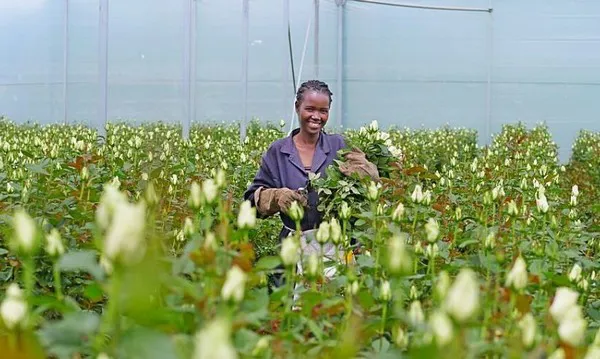Fairtrade flowers workers in East Africa experience higher wages, better working conditions, greater engagement in workers' rights issues, and gender equity than their non-Fairtrade certified counterparts, a new report has revealed.
The study, titled 'Impact of Fairtrade on flower workers and market access of flower farms in East Africa and conducted by Social Policy and Development Consulting Limited,' examines 11 producer organizations across Kenya, Uganda, and Ethiopia, including nine Fairtrade, certified, and two non-Fairtrade. The research builds off the inputs of more than 650 workers via survey and focus groups, as well as interviews with farm managers, Fairtrade staff, and other flower industry stakeholders.

Through their analysis, the researchers found that Fairtrade has a 'positive' economic impact on flower workers, with 69 percent of the workers on East African Fairtrade-certified farms reporting higher wages compared to their counterparts on non-Fairtrade-certified farms. The study indicates that the percentage of Fairtrade farm workers falling into the relatively higher wage brackets was more than twice as high at Fairtrade farms compared to non-Fairtrade farms.
In addition to boosted wages, the study's results note that nearly nine out of ten workers at Fairtrade-certified flower farms reported that they or their household members have individually benefited from Fairtrade Premium funds, with the most popular uses of the Premium going to education bursaries; home improvement items; and community projects such as water, health, and school infrastructure. The Fairtrade Premium, a unique tool available to Fairtrade-certified farmers, is an additional sum of money that farmers and workers invest in projects they choose. The report adds that the Fairtrade Premium appears to both "enable empowerment and reduce financial pressure" among the flower workers surveyed.
"The results of this study ring as a true confirmation that we are on the right track with the work we are doing," said Melanie Dürr, Global Product Manager for flowers and plants at Fairtrade International.
"From higher wages and greater economic security to supporting workers' rights and gender equity, Fairtrade offers real, tangible solutions for workers, farmers, and licensees. This is at the core of our Fairtrade vision and mission, and we are thrilled to see the proof in the proverbial pudding."
Flowers are a key Fairtrade product and are popular among consumers, particularly around fixed annual events such as Valentine's Day. In 2021 alone, 5.1 billion stems of Fairtrade flowers were produced by nearly 70,000 workers on certified East African farms representing more than 97 percent of Fairtrade's total flower production. Over the same period, Fairtrade flower sales generated more than €8.5 million in Premium worldwide.
The report's findings also show that Fairtrade workers are more confident in pursuing their rights at work, developing outside businesses, and engaging in their communities. This awareness also extends to gender equity as Fairtrade Africa trainings have demonstrably broadened workers' grasp of gender issues. More than half of the 71,000 workers on Fairtrade-certified flower farms around the world are women, and women hold more than 50 percent of leadership and management positions at said farms.
Meanwhile, farm managers interviewed by the researchers also indicated that the benefits of Fairtrade outweigh the cost of certification, including market access, stable prices, and long-term commitments from buyers. Citing Fairtrade's significant positive impact but noting the risk of falling sales in the current economic climate, flower traders recommended more efforts to create platforms with buyers and farms for an improved exchange, as well as greater emphasis on flowers within emerging sustainability and human rights legislation.
At the same time, the report also issues a number of recommendations and learnings, calling on Fairtrade to expand its engagement with workers and farms on collective bargaining and union representation, working towards a living wage, and strengthening environmental requirements.
"The report provides us with great encouragement and also meaningful insights by which Fairtrade can continue to grow, improve, and deliver for flower workers around the world," Ms. Dürr continued. "And while we are happy with the report's findings, we also know that much still needs to be improved and that we have to continue our work to further push wages up towards living wages. We look forward to building on these findings as we continue on our mission to building a fairer and more sustainable world for all."
For more information:
Fairtrade International
fairtrade.net










